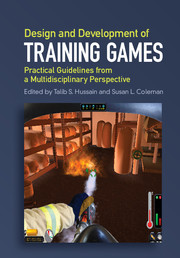Book contents
- Frontmatter
- Dedication
- Contents
- Contributors
- Acknowledgments
- Introduction
- Chapter 1 Learning Game Disciplines
- Chapter 2 Communication for Stronger Learning Game Design
- Chapter 3 Instructional and Gaming Elements
- Chapter 4 Story for Learning and Gaming
- Chapter 5 Authenticity in Learning Games
- Chapter 6 Design Better Games
- Chapter 7 Bridging the Gap from Design to Implementation
- Chapter 8 Integrating Games into Learning Environments
- Chapter 9 Multidisciplinary Learning Game Development Method
- Chapter 10 Game Review Criteria
- Chapter 11 Game Review
- Chapter 12 Development Methods
- Chapter 13 Game Review
- Chapter 14 Development Methods
- Chapter 15 Game Review
- Chapter 16 Development Methods
- Chapter 17 Game Review
- Chapter 18 Development Methods
- Chapter 19 Game Review
- Chapter 20 Development Methods
- Chapter 21 Game Review
- Chapter 22 Development Methods
- Chapter 23 Game Review
- Chapter 24 Development Methods
- Index
- References
Introduction
Published online by Cambridge University Press: 05 May 2015
- Frontmatter
- Dedication
- Contents
- Contributors
- Acknowledgments
- Introduction
- Chapter 1 Learning Game Disciplines
- Chapter 2 Communication for Stronger Learning Game Design
- Chapter 3 Instructional and Gaming Elements
- Chapter 4 Story for Learning and Gaming
- Chapter 5 Authenticity in Learning Games
- Chapter 6 Design Better Games
- Chapter 7 Bridging the Gap from Design to Implementation
- Chapter 8 Integrating Games into Learning Environments
- Chapter 9 Multidisciplinary Learning Game Development Method
- Chapter 10 Game Review Criteria
- Chapter 11 Game Review
- Chapter 12 Development Methods
- Chapter 13 Game Review
- Chapter 14 Development Methods
- Chapter 15 Game Review
- Chapter 16 Development Methods
- Chapter 17 Game Review
- Chapter 18 Development Methods
- Chapter 19 Game Review
- Chapter 20 Development Methods
- Chapter 21 Game Review
- Chapter 22 Development Methods
- Chapter 23 Game Review
- Chapter 24 Development Methods
- Index
- References
Summary
The design and development of learning games is a field of endeavor that crosses the boundaries of several disciplines. A successful computer game for learning (a.k.a. training game, educational game, serious game, instructional game) must weave together the skills and decision making of instructional system designers, game designers, software developers, story developers, assessment professionals, educational scientists, graphic artists, subject matter experts, instructors, and more. While prior publications have addressed theoretical issues from the perspective of one or two of these fields, and some publications have explored practical design and development issues, none has addressed the central methodological issues of how to produce an effective game with an explicit multidisciplinary approach. This book draws on the expertise and experience of a number of active participants in the field of learning games to provide practical guidelines and recommendations from a multidisciplinary perspective to assist you in your efforts to create effective learning games.
Definition of Learning Games
Before we dive into the issues surrounding the design of learning games, we must clarify what we mean by learning game. The literature reveals no consistent, widely accepted definition of learning games, although they are often classified as a subset of serious games for nonentertainment purposes (Sawyer & Smith, 2008). We prefer to distinguish learning games as having certain characteristics. In this book, we define learning games as games intentionally designed to help the player meet instructional goals while actively interacting with and being engaged and immersed in the experience. The learning game provides an environment in which the player must demonstrate a level of understanding of a body of knowledge or skills (expressed as learning objectives) to achieve game goals by solving challenges posed in the environment (e.g., identifying or resolving problems, completing tasks). The type of learning games we refer to require a significant design effort to achieve the learning goals.
- Type
- Chapter
- Information
- Design and Development of Training GamesPractical Guidelines from a Multidisciplinary Perspective, pp. 1 - 5Publisher: Cambridge University PressPrint publication year: 2014



